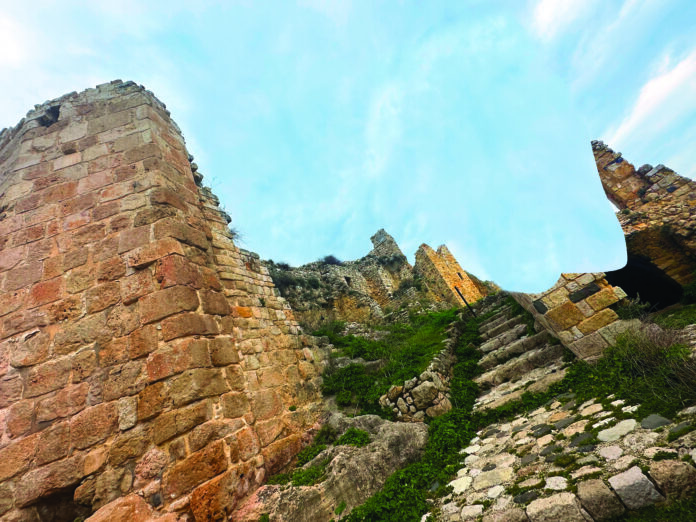In mid-February, I escaped the cold weather of Cleveland for an unlikely destination. While many of my neighbors and friends were flying to Florida, California or even Mexico, my destination was a bit more exotic—Syria. I’ve been a history buff from my early youth and have studied Middle Eastern history and the lives of its Jews for quite some time, so I saw this as a culminating “field trip” after so many years of research on the topic. I wanted to see for myself what was left of the once-vibrant Syrian community and its synagogues, some of which dated back thousands of years. And so, on a blustery Monday morning, I headed to the Cleveland Hopkins International Airport and began my trek around the world, going both forward and backward in time.
Although I had already been to almost every major country in the Arab world—including Iraq, Iran, Jordan, Egypt and Lebanon, and all of the Gulf states—I took extra precautions before embarking on this particular trip. I was a seasoned traveler in that region, but I was worried about going to Syria. Unlike other Arab countries, Syria doesn’t allow entry to Americans, nor does it have diplomatic ties with the United States, which would leave any American who is stuck there in a dangerous position.
Having learned from the mistakes of the bachur who went to Lebanon from Israel and was jailed there (whose story was featured in Ami), I asked my travel agency to find a partner agency in Europe to do the booking so that the computer’s IP address would be European, with the added precaution of using a VPN (virtual private network) to ensure that there was no digital trace of the US.
Obtaining an entry visa became the next challenge. I went online to Tripadvisor, and after combing through pages of reviews, I identified the best tour agency to aid me in the process. But even though I had taken advantage of the opportunity to obtain an Austrian passport—available to the descendants of Holocaust survivors who had been citizens of Austria—I was still initially denied a visa by the Syrian government. I was told by the travel agency that the rejection stemmed from the fact that my passport had been issued by the Austrian Consulate in New York and that the application also listed my birthplace as Columbus, Ohio.
I then located a second travel agency, and although they told me that they had gotten a verbal assurance from the Syrian government that I would be approved for an entry visa upon arrival, they weren’t able to provide any documentation to prove it. This made me nervous, because on my previous trips, the agencies I’d worked with had always given me printable proof before I hopped on a plane. In this case, up until the moment I landed, I didn’t know if my entry into Syria would be approved.
I planned to spend three days in Syria, and when I finally landed, it wasn’t actually in Syria, which doesn’t have a functioning airport for regular travel. Israel has bombed it many times—including the day after I departed, when they dropped bombs on Damascus—so most people fly into Beirut and then make their way to the Syrian border to enter the old-fashioned way.
The minute I landed in Beirut, I was in hostile territory, as Hezbollah controls the area around the airport. I arrived in the early hours of the morning, but everything was still dark because the electricity isn’t very reliable. The airport itself looks like an average facility, small and clean, but the staff and guards are very unfriendly and suspicious. They obviously didn’t want me to be touring their country, so they were happy to hear that I was going to the Syrian border, which sped up the entry process into Lebanon. As long as they were dumping me on the Syrians, they didn’t mind my passing through.
I hired a Lebanese driver to take me to the border, where I planned to meet my tour guide. (Imagine WhatsApping with a stranger to plan your meet-up at the Syrian border!) We drove for several miles, but since my driver was Muslim, when it came time for morning prayers, he wanted to hop out and pray at his mosque. I was left in the car by myself in the semidarkness, smack in the middle of Hezbollah territory. Although I saw no reason to reveal to him that I was Jewish, he could still identify me as a foreigner, and he suggested that I take precautions such as remaining in the car and not taking pictures. Needless to say, I complied.
After he finished his prayers, we drove another three hours so that I could cross the border into Aleppo. The scenery was very beautiful along the Mediterranean coast, especially as the sun was coming up. Lebanon is a mountainous country, with breathtaking views of the Mediterranean Sea down below.
Over the years, I’ve learned that you have to be careful what you talk about in Middle Eastern countries. We take freedom of speech for granted in America, but in many places you have to tiptoe around anything political or religious, so I schmoozed with my driver in broad, noncommittal strokes. While we were chatting, he warned me that the Syrians were going to check my belongings thoroughly at the border. I had my first inklings of fear since I had several items in one of my bags that identified me as both Jewish and American, including my tallis and tefillin.
To read more, subscribe to Ami





















